When developing Oracle Service Bus (OSB) services there are scenarios where OSB customization files cannot be used but you require environment specific customizations. This article extends the MyST Configuration Plans documentation to give examples of how to:
- Change 'HTTPS required' from 'false' to 'true'
- Change 'Authentication' from 'None' to 'Client Certificate'
- Attach or detach an OWSM Policy
Prerequisites
- MyST Studio release pipelines have been setup
- Artifact builds are publishing to MyST Studio via the MyST Jenkins Plugin or MyST Transport JAR
OSB Project
Create an OSB project which contains code for 'HTTPS required', 'Authentication', and 'OWSM Policy'. This ensures the code is created because default options are generally not included in the code.
- 'HTTPS required' and 'Authentication'
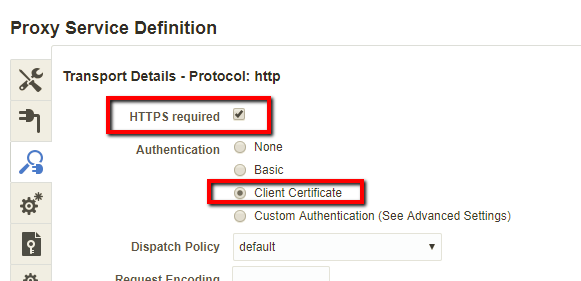
- 'OWSM Policy'
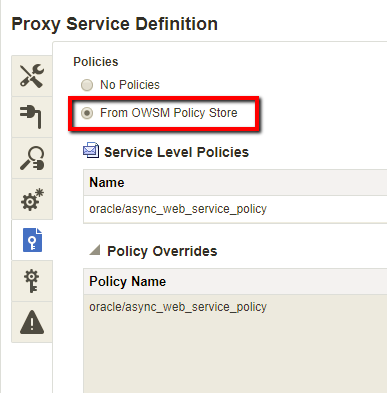
Maven POM
A myst configuration plan must be used. You can define the myst configuration plan in pom.xml:
<properties>
<myst-config-plan-location>(EMBEDDED)/myst-config-plan.xml</myst-config-plan-location>
</properties>
MyST Configuration Plan
Create a MyST Configuration Plan as follows. Take note of the following elements:
includeis a wildcard of files processed by the myst config planfilesetis file in which myst applies the myst config planreplaceis a property variable which can be customized per environment in the Stream Model
<tns:configplan xmlns:tns="http://myst.rubiconred.com/configplan">
<update-list>
<update>
<fileset>
<include name="**/*.stock.*.ProxyService"/>
</fileset>
<search-replace-list>
<search-replace>
<xpath>/proxyServiceEntry/endpointConfig/provider-specific/inbound-properties/use-https</xpath>
<replace>${ProxyUseHTTPS}</replace>
<action-on-not-found>warn</action-on-not-found>
</search-replace>
<search-replace>
<xpath>/proxyServiceEntry/endpointConfig/provider-specific/inbound-properties/client-authentication</xpath>
<replace>${ProxyClientAuth}</replace>
<action-on-not-found>warn</action-on-not-found>
</search-replace>
<search-replace>
<xpath>proxyServiceEntry/coreEntry/ws-policy/binding-mode</xpath>
<replace>${ProxyBindingMode}</replace>
<action-on-not-found>warn</action-on-not-found>
</search-replace>
</search-replace-list>
</update>
</update-list>
</tns:configplan>
Preparing your Deployment
Artifact Property Registry
After building the application you should see the property variables in the Artifact Property Registry.
- Go to Release Management > Artifact Property Registry
- Click Edit

- Define the defaults normally used for non-production as seen below.
- Click Save
NOTE: The _REMOVE_ value tells MyST to remove the node from the OSB code. When setting 'HTTPS required' to false you do not need the 'Authentication' code.
Stream Model
Here you can define the property variable.
- Go to Release Pipeline > YOUR_PIPELINE
- Click the cog for the Platform Model
- Select Open Stream Model
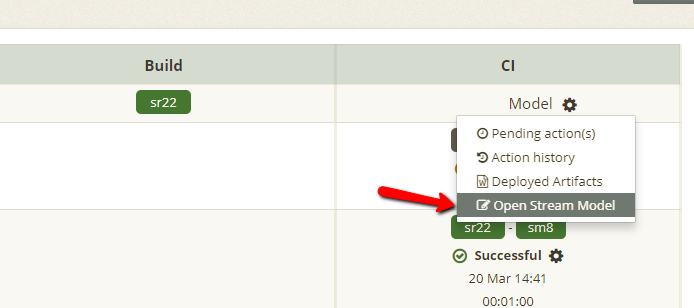
For non-production environments you can use the default values by typing or pressing the default values icon.
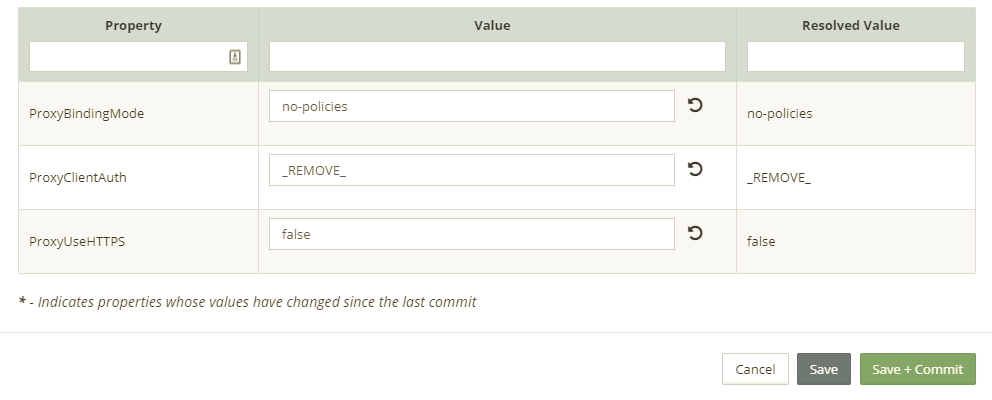
For production environments you will use the opposite values. ProxyClientAuth needs to be empty so MyST does not make any changes.
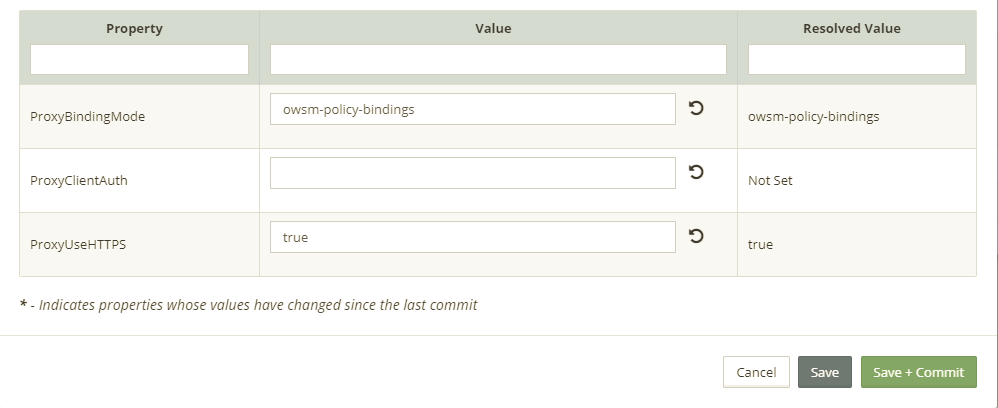
Deployment
Lastly the artifact can be deployed.
- Click the cog then click Deploy Release and to see a deployment summary
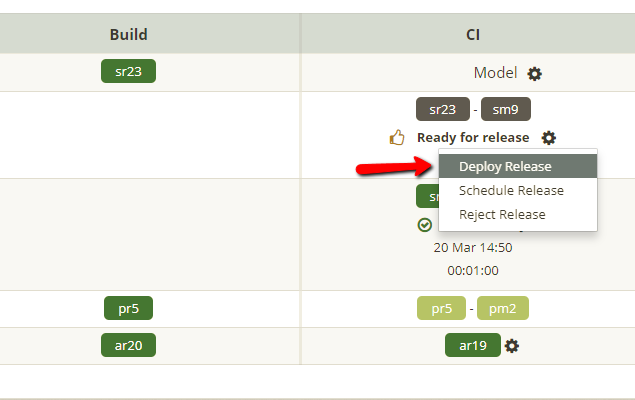
- Click Deploy
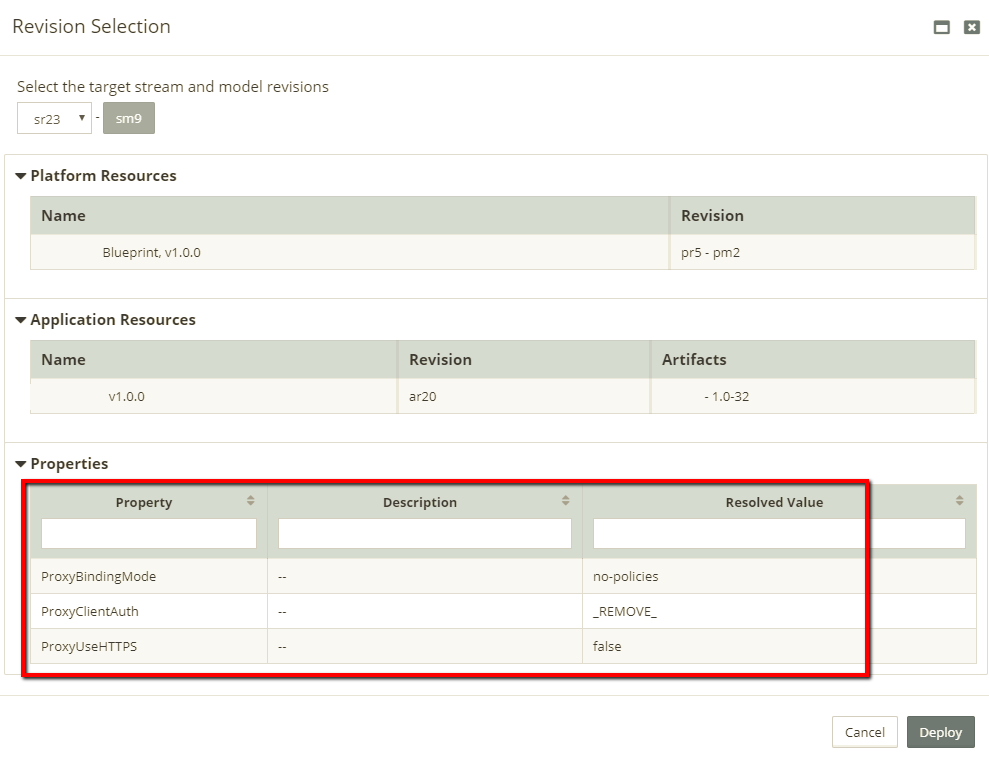
Troubleshooting
In case of issues you can look at the logs to see how the myst config plan was applied.
Importing /tmp/mystWorkspace/e0e2051a-d12a-41a5-a60b-6c8c6dd5e8a5/target/artifacts/com.rubiconred.osb/Stock-1.0-31.sbar
Applying the MyST configuration plan to the application
Trying to apply configuration plan '(EMBEDDED)/myst-config-plan.XML' to the source '/tmp/mystWorkspace/e0e2051a-d12a-41a5-a60b-6c8c6dd5e8a5/tmp/03-20-18-00-50-22-25621/d44cbafe-a88a-4478-956b-2622984bb9cd/Stock-1.0-31.sbar'
Parsing the plan contents
Removing the embedded plan file so that it does not get included in the final output
Expanding the entire resource hierarchy based on the plan
Performing the substitutions now
Resource - Stock-1.0-31.sbar
Resource - Stock/Stock_1.0/Stock_1.0.ProxyService
Packing the contents back into an archive if required
Plan execution complete. Preparing the execution summary
Resource - Stock-1.0-31.sbar
Status SUCCESS
Number of sub-resources matched - 1
Resource - Stock/stock_1.0/stock_1.0.ProxyService
Status SUCCESS
Substitution count, Total - 3, Successful - 3, Failure - 0, No matches - 0, Skipped - 0
The application binary after applying the plan is located at /tmp/mystWorkspace/e0e2051a-d12a-41a5-a60b-6c8c6dd5e8a5/tmp/03-20-18-00-50-22-25621/d44cbafe-a88a-4478-956b-2622984bb9cd/Stock-1.0-31.sbar
The logs of interest are:
Trying to apply configuration planindicates the myst config plan is attempting to be appliedNumber of sub-resources matched - 1indicates one file has been found to apply the myst config plan.Substitution count, Total - 3, Successful - 3indicates our 3 (out of 3) myst config plan searches and replaces were successful